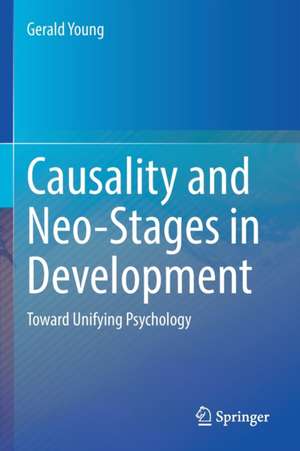Causality and Neo-Stages in Development: Toward Unifying Psychology
Autor Gerald Youngen Limba Engleză Paperback – 31 oct 2022
| Toate formatele și edițiile | Preț | Express |
|---|---|---|
| Paperback (1) | 885.33 lei 6-8 săpt. | |
| Springer International Publishing – 31 oct 2022 | 885.33 lei 6-8 săpt. | |
| Hardback (1) | 890.49 lei 6-8 săpt. | |
| Springer International Publishing – 31 oct 2021 | 890.49 lei 6-8 săpt. |
Preț: 885.33 lei
Preț vechi: 1079.66 lei
-18% Nou
Puncte Express: 1328
Preț estimativ în valută:
169.51€ • 176.51$ • 140.64£
169.51€ • 176.51$ • 140.64£
Carte tipărită la comandă
Livrare economică 14-28 februarie
Preluare comenzi: 021 569.72.76
Specificații
ISBN-13: 9783030825423
ISBN-10: 3030825426
Pagini: 447
Ilustrații: XXIII, 447 p. 54 illus.
Dimensiuni: 155 x 235 mm
Greutate: 0.72 kg
Ediția:1st ed. 2022
Editura: Springer International Publishing
Colecția Springer
Locul publicării:Cham, Switzerland
ISBN-10: 3030825426
Pagini: 447
Ilustrații: XXIII, 447 p. 54 illus.
Dimensiuni: 155 x 235 mm
Greutate: 0.72 kg
Ediția:1st ed. 2022
Editura: Springer International Publishing
Colecția Springer
Locul publicării:Cham, Switzerland
Cuprins
1) Introduction
2) Development, Stages, and Causality
3) Development, Brain, and Causality
4) Elaborating the Integrated (Sub)stage Model
5) Elaborating Causality in the Unified Model
6) Literature Review 2019
7) Extensions and Innovations
8) Literature Review 2020
9) Further Extensions and Innovations
10) Adaptation, Coping, Stress, and Development
11) Broadening Defense Mechanisms: Literature Review and Discussion
12) Evolution, Development, Culture, and Human Exceptionalism
13) Applying Transemics to Development, Culture, Causality, and Unifying Psychology
14) Ethics and ConclusionsNotă biografică
Gerald Young is a Full Professor in Psychology at Glendon College, York University, Toronto, Canada. He is a Fellow of the Association for Psychological Science (APS) and the American Psychological Association (APA). He has received awards from the American Psychological Association and the Canadian Psychological Association (CPA). Young is Editor-in-Chief of the journal Psychological Injury and Law, which he founded. His most recent books are Revising the APA Ethics Code (Springer, 2017) and Causality and Development: Neo-Eriksonian Perspectives (Springer, 2019). He has appeared as an expert witness for a case involving the Supreme Court of Canada. His practice covers rehabilitation and couples/ families.
Textul de pe ultima copertă
This book represents a broad integration of several major themes in psychology toward its unification. Unifying psychology is an ongoing project that has no end-point, but the present work suggests several major axes toward that end, including causality and activation-inhibition coordination. On the development side of the model building, the author has constructed an integrated lifespan stage model of development across the Piagetian cognitive and the Eriksonian socioaffective domains. The model is based on the concept of neo-stages, which mitigates standard criticisms of developmental stage models. The new work in the second half of the book extends the primary work in the first half both in terms of causality and development. Also, the area of couple work is examined from the stage perspective. Finally, new concepts related to the main themes are represented, including on the science formula, executive function, stress dysregulation disorder, inner peace, and ethics, all toward showing the rich potential of the present modeling.
Caracteristici
Offers new model of neo-stages to overcome standard model cirticisms
Provides new insights for working with couples
Includes new concepts relating to executive function
Provides new insights for working with couples
Includes new concepts relating to executive function
